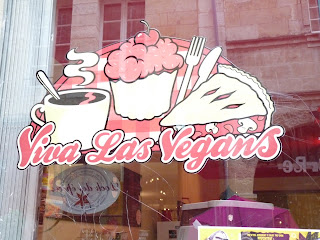I have not been able to post my writing lately, as I have not had a computer for the past two months. Alas, I will soon be reunited with my handy Macbook and will be back to contemplating nature.
While visiting a friend's family this weekend in Frontenay Rohan Rohan, I saw a six year old girl type a song name into Youtube and load a video. This is indeed the computer generation.
While I was shocked at her computer comprehension, I was more shocked by the song that came onto the screen. You can watch the music video below, and I strongly suggest that you do.
"Aux Arbes Citoyens"Even if you don't know a word of French, it's easy to discern the message of the song by watching the music video. Yannick Noah is a retired French tennis player who has started his own charity for underprivileged children and has now become a popular musician. This song is played on radio stations throughout France, even if it has a strong emphasis on sustainability and environmental consciousness. How often are songs like this popular for mainstream audiences in the United States?
Just by watching the video, we understand that there is some sort of nuclear, or at least destructive, energy being planned for the entire planet. A bunch of guys in suits are plotting where to put the power plants, but the men are completely unaware of what is happening to four children across the globe: a boy in Africa watches a goat collapse from thirst--water shortage, a girl in Greenland literally has the ice melt from beneath her while she is fishing--global warming, a girl in a South American rain forest is bombarded by machines tearing down the forest-deforestation, and a boy in India is sitting on the harbor when a boat comes in with radioactive, toxic waste--pollution. These kids are pretty fed up with their homes being destroyed, so they march over to the world's leaders and take over the meeting. After explaining how to derive energy from natural means, the men in suits applaud the children.
The video alone is quite provocative. Yet the six year old who showed me the song in the first place was singing along with the video. She knew the words just as well as she knew the words to Inspecteur Gadget (en francais). Take the title of the song: "Aux Arbres Citoyens."
Aux is the plural equivalent to at,
arbres means trees and
citoyens means citizens. Thus, the title basically translates to "To the trees, citizens" Yet the French say "Aux armes, citoyens" meaning "take/to arms, citizens" in referencing the French Revolution--when the starving peasants rose up against the French government and took complete control in a particularly violent manner. Furthermore, "Aux armes, citoyens" is in the French national anthem commemorating when the people of France stood up for justice. Another level to the meaning of the title is that "Aux Arbres" and "Aux Armes" sound particularly similar in French and is a play on words.
Commanding citizens to go to the trees sounds a little bizarre, so let me discuss the song a little more. The first few verses are about the condition of the world: poison in the water, cement in the fields and mountains. The earth is hurting, and we are losing our culture and history because of it.
Then, the chorus states "Puisqu'il faut changer les choses, aux arbres citoyens ! Il est grand temps qu'on propose un monde pour demain!"
Since we must (it is necessary) for us to change things, to the trees, citizens! It is time for us to propose a world for tomorrow!
The next set of verses say that we should spread the word, form an army of reeds (imagery, of the earth, that calls to a plant that is so strong it does not even break in strong wind). "C'est vrai la terre est ronde, mais qui viendra nous dire qu'elle l'est pour tout le monde...Et les autres à venir... "
It's true that the earth is round, but who will say to us that she (the earth) is for everyone and the others to come. Thus, we must share the earth with everyone on it (unlike now when we have obesity problems in America and not enough clean water in Africa) and with those to come--the future.
"Plus le temps de savoir à qui la faute de compter la chance ou les autres. Maintenant on se bat avec toi moi j'y crois."
No more time left to know who is to blame, to count our chances or the others. Now we must fight, with you (your help) I do believe. Hence, we should stop pointing fingers at one another and unite together in order to face our ecological problems.
I cannot say for sure whether or not the United States has radio hits that seek to encourage the public to be more sustainable and environmentally conscious. I hope that you will consider what American music is about and compare it to this song by Yannick Noah--a man who is continually voted most popular singer in France. Even a pop song can make a different in a country's lifestyle, as many other people like the six year old I witnessed are singing along to this song. Perhaps if America could produce more music, more art, more films and more literature--even fashion--that seek to capture just how important it is to be environmentally sustainable, maybe the youth of America could take control of our unsustainable, unjust practices and make the world a better place for everyone.




